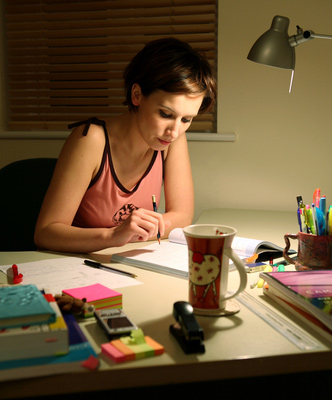![]() I have to start work at 8 am every morning. I'm not sure exactly who decided that scientists should start early, but it seems to be a universal assumption. Throughout college my science classes were always first thing, and research efforts often seem to involve early morning work. But I've never really been a morning person. Last night is a great example: I had to clean up the house in preparation for Barry's brother coming to stay with us (which, with a dog and a cat and two messy people, is no small feat). We started when we got home and tackled room after room. As I looked up at the clock and saw the haunting numbers 12:23 am staring back at me, I thought to myself, "Ok, maybe I should get some rest," but I felt awake, focused, and ready to finish the task at hand. Then, of course, in about an hour I passed out.
I have to start work at 8 am every morning. I'm not sure exactly who decided that scientists should start early, but it seems to be a universal assumption. Throughout college my science classes were always first thing, and research efforts often seem to involve early morning work. But I've never really been a morning person. Last night is a great example: I had to clean up the house in preparation for Barry's brother coming to stay with us (which, with a dog and a cat and two messy people, is no small feat). We started when we got home and tackled room after room. As I looked up at the clock and saw the haunting numbers 12:23 am staring back at me, I thought to myself, "Ok, maybe I should get some rest," but I felt awake, focused, and ready to finish the task at hand. Then, of course, in about an hour I passed out.
 How was it, though, that I was so competent, able, and clear almost 18 hours after I got up in the morning? Scientists from the University of Liège might just have an answer. It turns out that people who self-describe as "night owls" instead of "early birds" maintain higher levels of attention and perform better on mental tasks as the evening wears on.
How was it, though, that I was so competent, able, and clear almost 18 hours after I got up in the morning? Scientists from the University of Liège might just have an answer. It turns out that people who self-describe as "night owls" instead of "early birds" maintain higher levels of attention and perform better on mental tasks as the evening wears on.
The study, published in the latest issue of the journal Science, took 16 early birds and 15 night owls and looked at how their brain functioned 1.5 and 10.5 hours after they woke in a sleep lab. Participants were allowed to maintain their preferred sleep patterns (up early or late, with the early birds up on average 4 hours before the owls), but were kept awake for the same number of total hours a day. As well as testing the subjects' abilities on mental tasks, researchers took saliva samples to measure hormone levels and looked at how their brains were working with fMRIs.


Early Risers (red) and Night Owls (blue)
Throughout the day, your body balances being alert and awake and wanting to sleep. The two antagonize each other - early on, your alertness is high and your sleepiness low. But as the day progresses, the urge to rest rises, until it eventually overcomes. It appears that in people who tend to stay up later, the part of their systems which contributes to that "awake" side stay stronger, longer, allowing them to be more alert despite rising urges to sleep. This could translate to being more productive for longer periods of time than early risers, and explains how some night owls end up being highly successful people (Charles Darwin and Winston Churchill, to name a couple).
However, before us late-nighters get too excited, I should note that those annoying morning people do have one huge advantage - they're pattern matches society's. For those who get to determine their own hours, the sustained mental sharpness can be a huge advantage. But for the majority of us, performing better 10 hours after they'd like to get up doesn't do as much good - it doesn't matter if you're in tip-top form at 9 pm when the work day ends at 5.
Schmidt, C., Collette, F., Leclercq, Y., Sterpenich, V., Vandewalle, G., Berthomier, P., Berthomier, C., Phillips, C., Tinguely, G., Darsaud, A., Gais, S., Schabus, M., Desseilles, M., Dang-Vu, T., Salmon, E., Balteau, E., Degueldre, C., Luxen, A., Maquet, P., Cajochen, C., & Peigneux, P. (2009). Homeostatic Sleep Pressure and Responses to Sustained Attention in the Suprachiasmatic Area Science, 324 (5926), 516-519 DOI: 10.1126/science.1167337
- Log in to post comments
